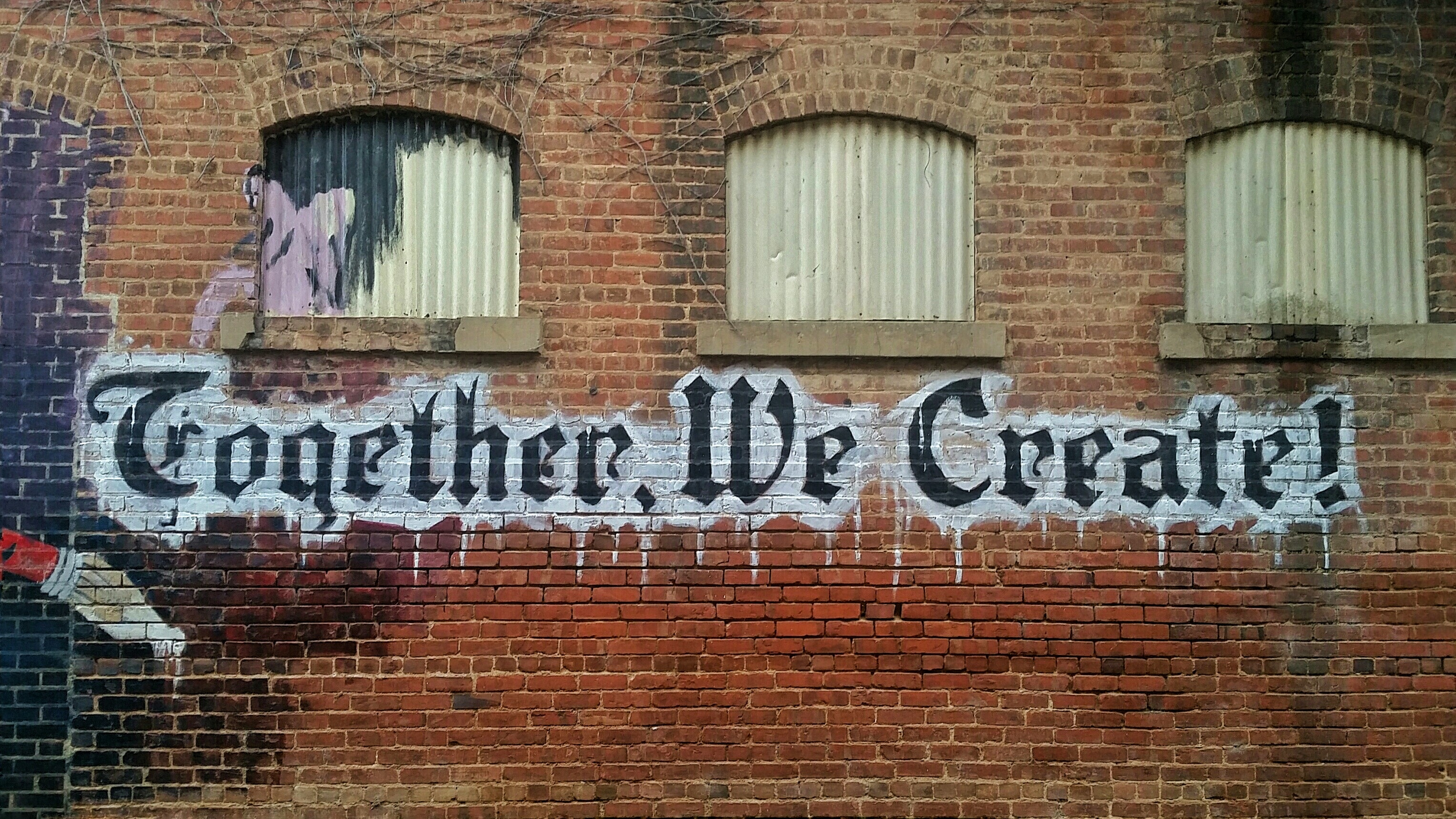In March 2020, life as we knew it changed dramatically. As news of Covid-19 became increasingly concerning, Dudley CVS made the decision to suspend face-to-face meetings and we were faced with the task of pivoting to working remotely and holding virtual meetings, on top of adapting our work to support the community response to the pandemic.
I love my job. Every week is different. But a massive chunk of my time, perhaps 40%-50% of it, is spent in some form of face-to-face meeting. Whether it’s meeting groups and supporting them with setting up, planning, funding bids and the like, giving training, holding drop in sessions in cafes around the borough with Eileen, meeting with colleagues to cook up new ways to support the sector and at conferences.
In March 2020 all of that changed. How would we continue to support groups and help with the huge-scale efforts to keep those shielding or isolating connected?
Looking back into the whirlwind of that time from a much calmer vantage point, we moved to online support very quickly. We supported groups by email, phone and video meeting (first with Skype and then with Zoom and Teams!), learning as we went and supporting colleagues as well as groups with using online platforms. We offered drop ins, training events, networking meetings, one-to-one support and so many people and groups connected with us, many with a renewed eagerness to work together.







I’m amazed to learn that I supported 90 groups last year, giving support and guidance on the usual things like setting up, planning, community asset transfer and fundraising, and on new things like thinking through Covid-19 procedures and holding virtual AGMs, even helping to run a few! And I’ve helped people to set up not-for-profits without ever meeting them face-to-face. Sprit of Djembe and Partners With Industry are two very different not-for-profits that formalised during the year.
Spirit of Djembe

Spirit of Djembe is an African drumming group based in Stourbridge. Their founder, Faith, got in touch with me to talk about formalising as a small not-for-profit with a constitution, something that they could work on while they were unable to get together for rehearsals and drumming sessions. Over a couple of months, I talked Faith through the process, introduced her to a simple constitution that would allow the group to open a bank account and fundraise in its own name, and supported Faith to engage with members in a way that involved them in the process and spread the leadership.
This work culminated in a Zoom meeting where I met some of the members of Spirit of Djembe, one of the loveliest meetings I’ve been involved in over the course of the pandemic. What struck me most about this welcoming group, was how members were so supportive of one another. Although clearly missing coming together face-to-face, they’d made an effort to come together socially on Zoom, and even worked out a way to rehearse their drumming online. Everyone made me feel so welcome. I know constitutions don’t get many people excited and engaged, but as I talked them through their draft, answered questions and made changes they wanted for their group, I felt that everyone was participating. At the meeting, I also helped them appoint their first committee and talked to the members about the roles and responsibilities of the committee. I left the meeting feeling that the group was really well organised and I hoped they would be able to get together to do what they love soon.
Fast forward a few months later and I’ve given the group some guidance around data protection principles and some pointers on insurance as Faith told me they have their first booking since the first lockdown began!
And if you’re looking for something new to do as restrictions ease, if you’d like to meet a welcoming and supportive group of people and learn something new, then now might be a good time to join Spirit of Djembe. If you’re interested in joining, you can call Faith on 07526 261250.
I do hope that as restrictions ease, Spirit of Djembe goes from strength to strength!
Partners With Industry CIC
Back in October, Partners With Industry CIC existed only as an idea of its founder Richard. Richard’s background was in automation and robotics and he wanted to set up an organisation that focused on equipping people who were unemployed or wanted to retrain with the skills required for jobs in the modern automated working environment of the future. Richard also wanted this work to benefit people with learning disabilities and the training would go from reskilling complete beginners to learn new skills to advanced skills to help existing engineers get back into the workplace.
I offered Richard a virtual meeting to have an initial chat about the possible routes available in our sector and the types of rules and regulations a not-for-profit would be subject to, and to learn more about Richard’s vision. At our meeting, I was really pleased to learn that Richard had started planning and had made links with Dudley College, West Midlands Combined Authority and Dudley Business First. Richard also told me that he was particularly interested in helping people living with dyslexia and autism to train and to have better opportunities to get into the industry. This seemed quite compatible with being a social enterprise, which is a business set up for social purposes.
I talked Richard through a resource which shows the similarities and differences between a charity, a social enterprise and a profit-making business/sole trader and the extra rules and expectations associated with being a not-for-profit. Richard was interested in learning more about social enterprise models; it felt like the CIC might be a good fit for the new organisation, which would allow it to pursue social aims for the benefit of the community and raise income in a range of ways, such as trading.
I gave Richard some guidance about CICs and directed him to some great resources provided by the CIC Regulator and encouraged him to look at examples of social enterprises provided by organisations like Social Enterprise UK and was on hand to talk through ideas that Richard was testing. I was really impressed with Richard’s ideas for operating as a business in order to benefit communities and the links he’d begun to make with potential partner organisations.
Richard brought a colleague on board and they decided to pursue the CIC route. Because both were new to CICs, I offered training on governance for CICs and supported them to get the company set up, giving step by step guidance, helping with the social purpose and explaining the memorandum and articles.
Then in January, I was pleased to learn Partners With Industry had officially become a community interest company. Richard got in touch to tell me the good news and told me
“We very much appreciate your help and it would have been impossible for us to do without your help, advice and guidance.”
Since then, Partners With Industry has set up its website, expanded its business to offer paid services to businesses and made partnerships across the country. I’ve also connected Richard with Eileen from our Volunteer Centre so that Partners With Industry can offer a great volunteering experience too. Richard also hopes to be a Voice of Innovation for the West Midlands Innovation Alliance, which promotes innovation in science and technology.
It’s been great supporting these and many other organisations during a challenging year, and I’m looking forward to working with more as we emerge from the pandemic.
In fact, Dudley CVS is collaborating with consultant David Waterfall to bring an exciting new opportunity to support the sector in Dudley borough to reset and rebuild following the pandemic.
Reset, Rebuild & Reimagine will provide the opportunity, with guided expert external facilitation, for the sector to take stock, refocus and reimagine where next in terms of rebuild and recovery. More specifically Reset, Rebuild & Reimagine will offer:
- Opportunities to explore and share together what impact the pandemic has had on your organisation
- The opportunity to help co-design future Reset, Rebuild and Reimagine sessions
- Opportunities to develop and learn new skills and insights from a range of external professionals. Topics may include: improving resilience, employment law in relation to Covid-19, help with technology adoption, market development, engaging clients in new ways, business modelling, impact evaluations, financial sustainability, forward strategy etc
- Dedicated time and space for peer support and action learning
- A platform for embarking on a journey of exploration, skills development and shared learning together for resetting, rebuilding and reimagining the future of the VCFS across Dudley Borough, and
- A platform to share amazing stories about how you have adapted your organisation to meet the needs of Dudley residents.
Reset, Rebuild & Reimagine will kick start with two sessions on 28 June to co-design with you the shape and content of this exciting and innovative programme, with two places per organisation available. For more information and to book, please visit our story on Reset, Rebuild & Reimagine.








 I just wanted to say a big ‘THANK YOU!’ to everyone who got involved in Small Charity Week in Dudley borough and to highlight the organisations that joined in our conversations.
I just wanted to say a big ‘THANK YOU!’ to everyone who got involved in Small Charity Week in Dudley borough and to highlight the organisations that joined in our conversations.
 group of people that had been volunteering on the site supported by West Midlands Historic Buildings Trust. They wanted to ensure that they still had a way to liaise with the local authority and to continue volunteering onsite once West Midlands Historic Buildings Trust’s funded project had come to an end. We worked with the volunteers using a variation of
group of people that had been volunteering on the site supported by West Midlands Historic Buildings Trust. They wanted to ensure that they still had a way to liaise with the local authority and to continue volunteering onsite once West Midlands Historic Buildings Trust’s funded project had come to an end. We worked with the volunteers using a variation of  eveloped a short constitution to get all of this into writing.
eveloped a short constitution to get all of this into writing.
 So that was my year. I’m already enjoying the challenges of this one and I’m looking forward to sharing more about the amazing work that Dudley’s community groups, charities, social enterprises, volunteers and active citizens do every day.
So that was my year. I’m already enjoying the challenges of this one and I’m looking forward to sharing more about the amazing work that Dudley’s community groups, charities, social enterprises, volunteers and active citizens do every day.
